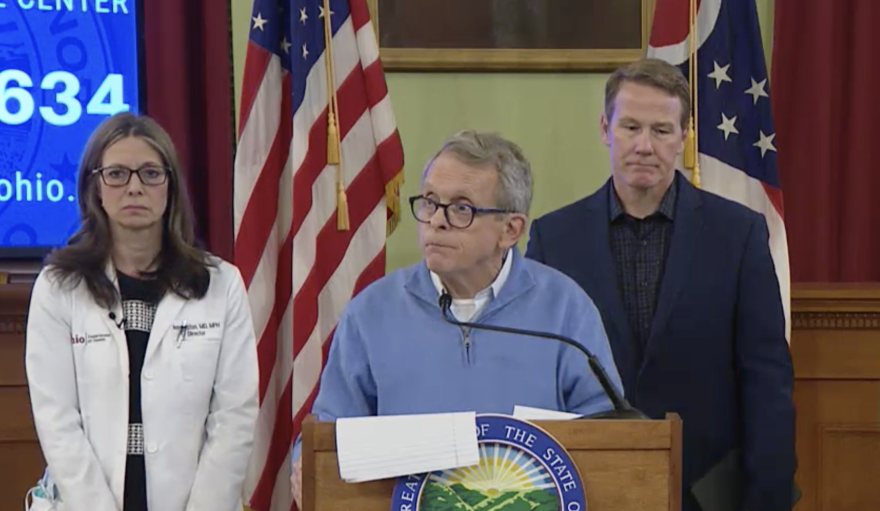The thousands of Ohioans whose elective procedures were postponed as a result of the state’s coronavirus outbreak will soon be able to access the treatment they need.
At his daily briefing Wednesday, Gov. Mike DeWine said first priority will be given to patients awaiting surgeries.
The state announced a halt to elective procedures March 17 in hopes of preserving scarce masks, gloves and other protective equipment known as PPE that are desperately needed for health-care workers, ICU beds and other critical medical resources.
The governor urged physicians to talk with their patients in need of elective procedures to assess their health and quality of life and determine which procedures should move forward. Diagnostic procedures and those needed to address chronic conditions could also be considered if a patient’s health issues are interfering with their quality of life.
“Patients must be informed of the risk, of course, of contracting COVID-19, and that impact during the post-operative recovery process,” DeWine said.
The governor did not announce a timeline for reopening private medical and dental offices.
Even as the state celebrated some hopeful news in its move to begin easing the Stay At Home and essential business orders, the DeWine administration also stressed the need to further stem the financial emergency many Ohioans are facing. Jobless claims are at record highs in Ohio, with around a million jobs shed since mid-March.
The state reports so far paying out more than $850 million in unemployment benefits since March 15. More than 350,000 people are still waiting for their applications to be processed and nearly 150,000 claims have been denied.
"We are actively examining right now all of the different ways we can alleviate some of the restrictions around those claims in order to move them through more quickly. And so we're diligently focusing on that at this time," said Kimberly Hall, director of the Ohio Department of Job and Family Services.
Lt. Gov. Jon Husted acknowledged the dire economic impacts of the global coronavirus pandemic on struggling small businesses and their furloughed employees, and on cities and local governments that are already forecasting they may be forced to cut fire, police and other services in coming years as the impacts to their budgets mount.
The state is in talks with essential businesses that have remained safely open throughout Ohio’s outbreak to compile best practices intended to guide now-closed businesses as they resume their operations.
He stressed the need to mitigate the dangers of the virus to employers, employees and their customers, saying small businesses must learn to operate safely.
“You’ll be armed in this battle with masks, sanitizer, soap, disinfectant, six feet of safety and the various strategies we know work,” Husted said.
The Ohio Department of Health reports more than 14,000 COVID-19 cases statewide, including 13,609 cases confirmed through testing and another roughly 500 probable cases.
Health director Dr. Amy Acton said hospitals are counting more critically ill COVID-19 patients admitted to the ICU with dangerously low oxygen levels. Acton said it’s important to identify positive COVID-19 cases earlier to try and prevent more people from deteriorating at home and having to come to the ICU as beds fill up.
Test kits remain in short supply, but Dewine said the state continues to expand its ability to test for COVID-19, to test for virus antibodies among COVID-19 survivors, and to conduct broader contact tracing to better identify cases and potential viral hotspots where the disease could spread quickly.
DeWine said he’s growing more “optimistic” about the state’s testing capacity, especially among health workers and other essential employees.
Ohio has confirmed its first COVID-19 case in the juvenile detention system, and state officials say contract tracing is underway to identify other young people and corrections staff who may also be infected but may not be exhibiting symptoms.
Ohio has launched a new mental-health assistance hotline to help anyone struggling with isolation, stress, addiction or other issues related to the coronavirus pandemic. The hotline is staffed with licensed, trained counseling professionals and is designed to provide real-time assistance as well as connect callers who need it with continuing care in their communities down the road.
Anyone in need of emotional support is asked to call 800-720-9616 during the hours of 8 a.m. and 8 p.m. every day.
After 8 p.m., Department of Mental Health and Addiction Services officials say calls that come into the hotline during off hours would be routed to a 24-hour suicide prevention hotline.


